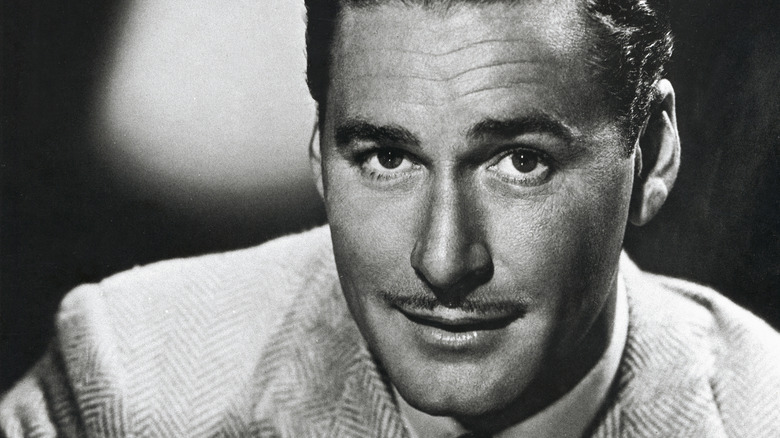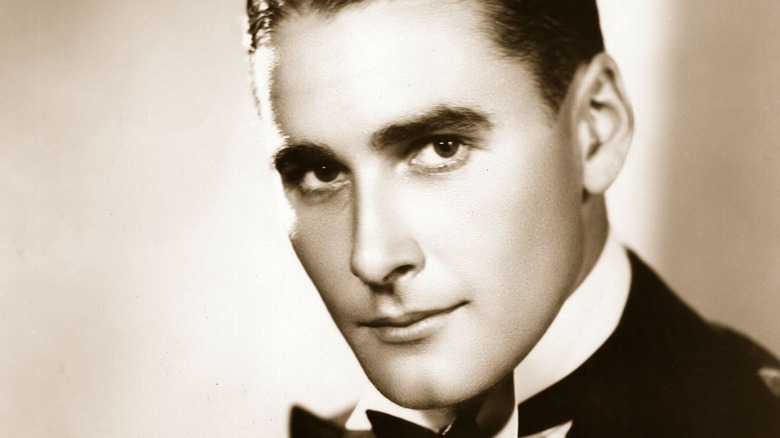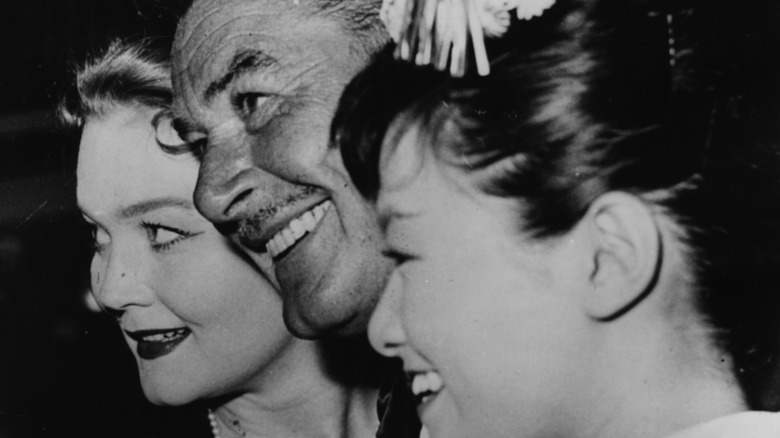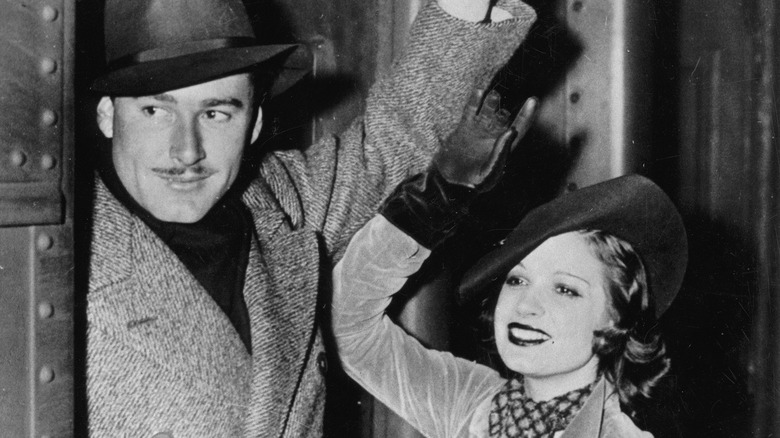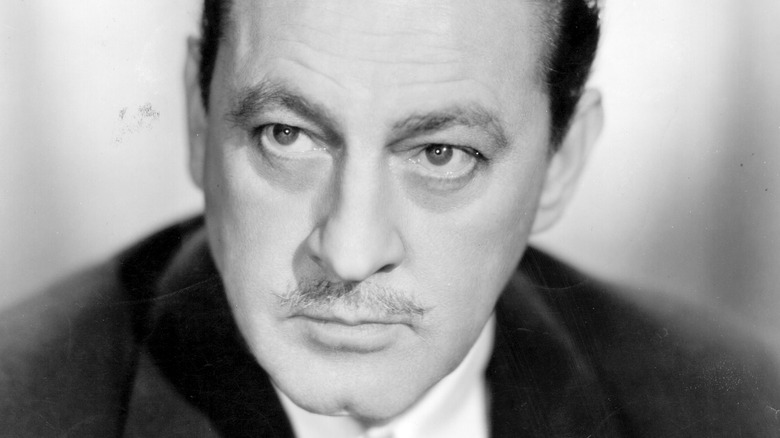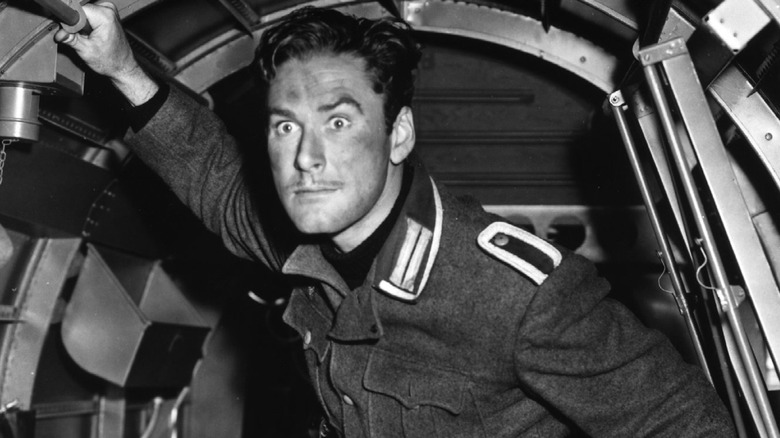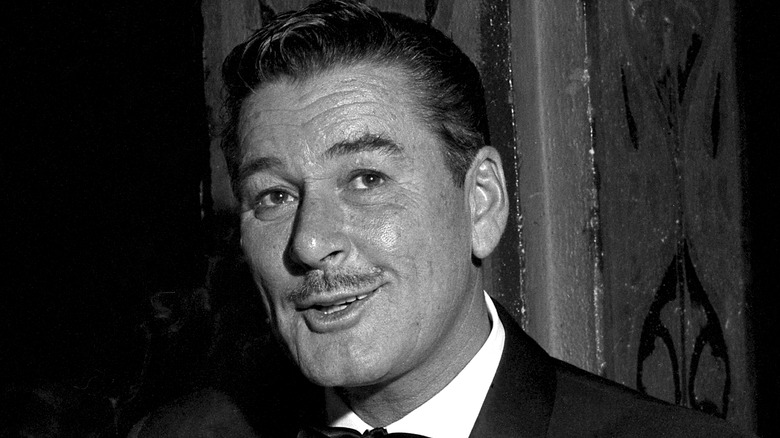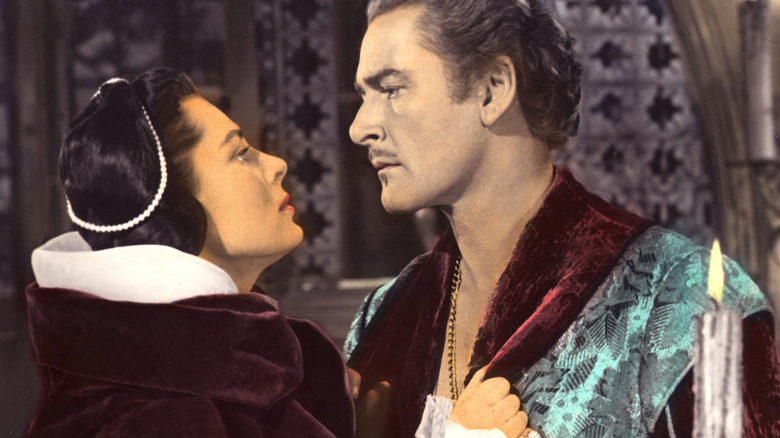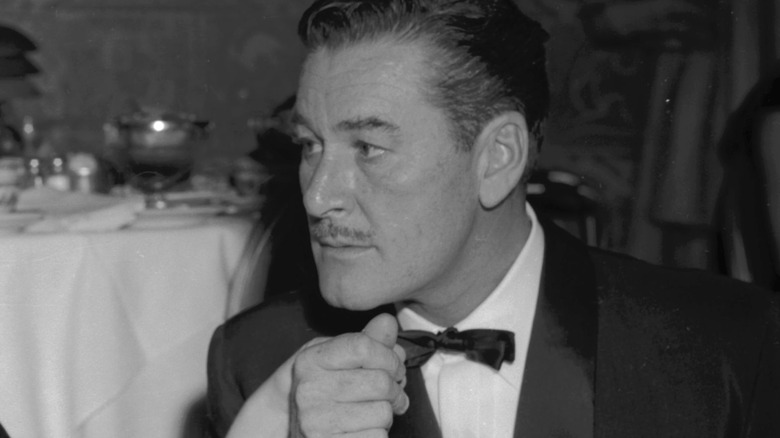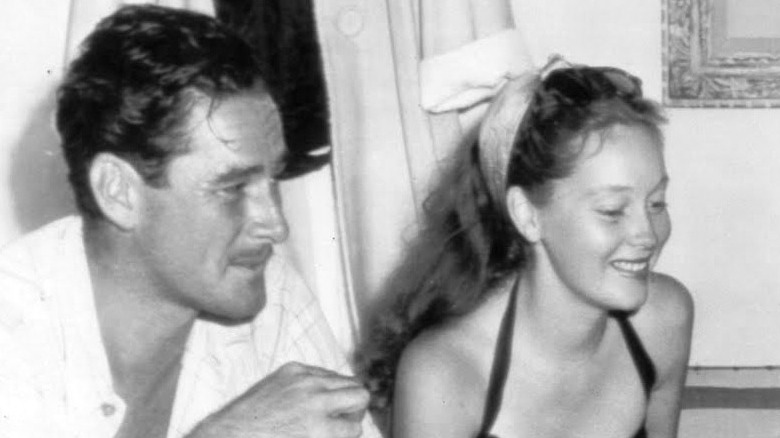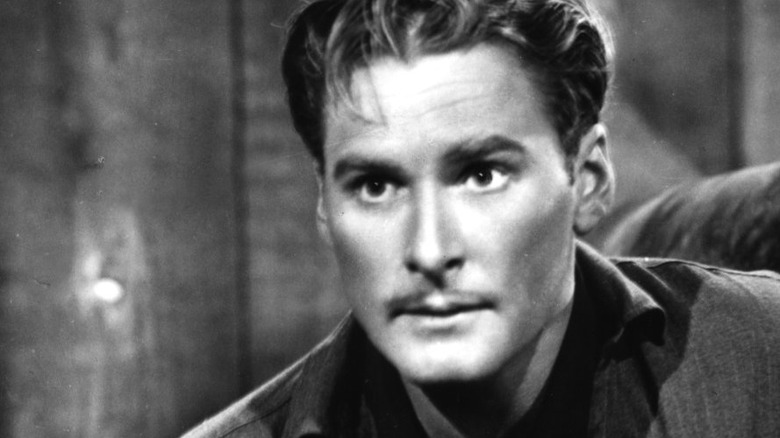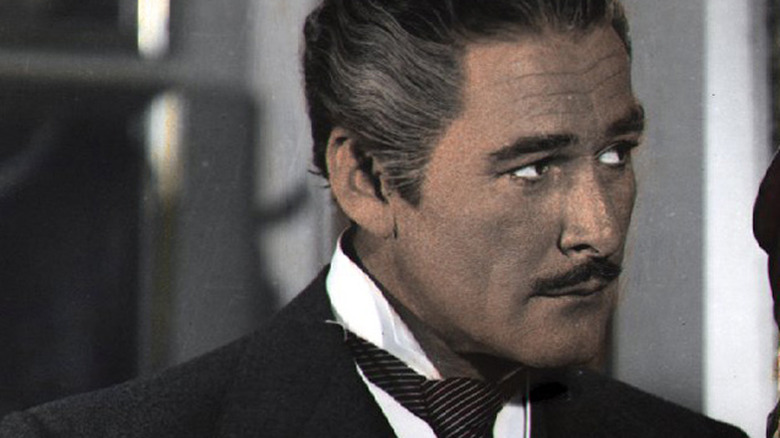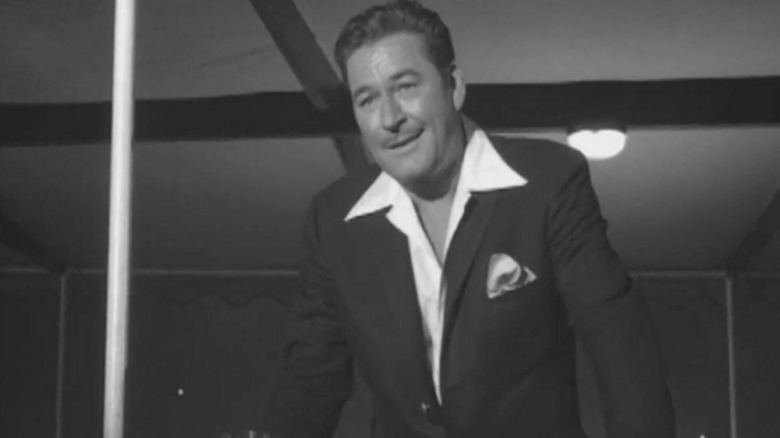The Untold Truth Of Errol Flynn
Errol Flynn was an icon of Hollywood's golden age. Throughout the 1930s and '40s, Flynn starred as swashbuckling rogues and dashing heroes in historical action hits like "Captain Blood" and "The Adventures of Robin Hood." Flynn was a true movie star, but he may have been even more famous for his personal life. Stories of his sexual exploits and misadventures have become the stuff of Hollywood legend — helped along and often exaggerated by Flynn himself. Many of the most sordid details of his life come directly from his autobiography, titled "My Wicked, Wicked Ways."
As noted by Turner Classic Movies, the public was just as fascinated with the actor's private life as they were by his films. He was at the center of one of Hollywood's first major sex scandals and became notorious for sneaking alcohol and drugs onto the set and being intoxicated while filming. His legacy is a complex one, and both his thrilling films and controversial life continue to fascinate audiences more than half a century after his death.
He claimed he was charged with murder in his youth
While Errol Flynn became a star in the United States, he spent much of his childhood in Tasmania. True to his future roguish persona, he was a rebellious child who rejected authority. At the age of 7, he briefly ran away from home after being beaten for secretly "playing doctor" with a young girl, and at 17 would be expelled from school and involved in an Australian gang. According to an article from Vanity Fair, his own mother often referred to him as a "devil in boy's clothing."
Many of the most shocking and horrific stories of his life before Hollywood were told (and likely embellished) by Flynn himself. He was sometimes a ship captain and sometimes a gold prospector, and for a while he worked as what he described as a slave trader.
In his autobiography, he described traveling through New Guinea, tricking the Indigenous people into coming to plantations with him, and being paid for selling them into indentured servitude. According to Flynn, he was on one of these horrific trips through New Guinea when he and his assistant were attacked in the jungle. His assistant was killed, and Flynn claimed that he personally shot one of the attackers in the neck, killing him. He was supposedly tried and acquitted for the murder, but would soon leave New Guinea anyway because he had contracted a serious case of gonorrhea.
Errol Flynn conned his way into Hollywood
Errol Flynn's first film role wasn't in Hollywood. As described by Vanity Fair, when Flynn was captaining a boat on New Guinea's Sepik River, a film called "In the Wake of the Bounty" was shooting in Tahiti. When his boat was hired by the filmmakers to shoot some B-roll, he caught the eye of an executive, who thought he was the perfect type to cast as Fletcher Christian. The film wouldn't be the one to make Flynn a star, but it did ignite a desire to become an actor.
It is believed that Flynn was dating a wealthy older woman at this time, and that he stole and sold some of her jewelry in order to pay for a trip to England (though he claimed he took a roundabout route that took him on startling adventures from Hong Kong to the Philippines). As described in "You Must Remember This," Flynn conned his way into a British theater company by convincing them he was a major star in Australia. He even provided them with a list of credits — all fake. From there, he was cast in a murder mystery that was being filmed by Warner Brothers in London. Soon, he was invited to Hollywood.
His first marriage was chaotic and violent
In 1934, Errol Flynn set sail for New York. His trip was an eventful one. According to his autobiography, "My Wicked, Wicked Ways," his fellow passengers included several famous stage actors, a Russian princess, and a French film star named Lili Damita. Damita would become Flynn's first wife — but they didn't hit it off right away. According to Flynn, when he asked the star to dance with him, she replied, "Perhaps. Come back later."
When they met again in Hollywood, however, they started a romance almost immediately. According to a biography of Flynn by Tony Thomas, the two were married for seven years, but few of them were happy. They argued so much they were sometimes referred to as "The Battling Flynns." It is believed that their fights were often physical, and Flynn frequently arrived on set with injuries from his wife throwing things at him. As described on the podcast "You Must Remember This," when Flynn was late to their one-year anniversary party, onlookers witnessed Damita smash a bottle of champagne over his head, and he hit her in the face, breaking her tooth. They both ended up in the hospital. The studio was concerned about what the public would think of one of their stars hitting his wife, so the incident was covered up, and their injuries were explained away as the result of a car crash caused by Flynn heroically swerving to avoid hitting a cat in the road.
If you or someone you know is dealing with domestic abuse, you can call the National Domestic Violence Hotline at 1−800−799−7233. You can also find more information, resources, and support at their website.
His best friend's corpse supposedly came for a visit
Actor John Barrymore was Errol Flynn's mentor and one of his closest friends. He was famous as a great actor of the silent era but also for partying (per Britannica). As described in "You Must Remember This," by the time he met Flynn, Barrymore's alcoholism had taken a toll on his career. This didn't make him any less of a hero to Flynn. After his inevitable divorce from Lili Damita, Flynn spent more and more time partying with Barrymore. Barrymore would frequently stay at Flynn's house, which caused some conflict, as Barrymore would frequently relieve himself out the windows and in the fireplace.
When Barrymore died in 1942, Flynn was devastated. Several famous names in Hollywood allegedly concocted a plan for a ghoulish prank on Flynn. Some claim it was Humphrey Bogart and Peter Lorre, but according to Flynn's autobiography, it was Raoul Walsh, who was famous for acting in "The Birth of a Nation" and directing films such as "White Heat." According to legend, Walsh came up with a lie about being a friend of Barrymore's aunt and paid the undertaker $100 to let him borrow the actor's body. Walsh and his accomplices snuck the corpse into Flynn's house and propped it up in a chair. When the very drunk Flynn returned home, he found the dead Barrymore waiting for him. According to Flynn, he was so terrified he ran back out of his home and was preparing to drive away when the pranksters came clean.
He never went to war
Unlike many of his contemporaries in Hollywood, Errol Flynn never fought in World War II. There have been a few explanations for why he was never in the army. Some have speculated that Flynn simply didn't care about the war. As stated in "You Must Remember This," several of Flynn's friends believed he was intentionally avoiding service, either because he was afraid or because he didn't seem to care very much about the war in general. One of Flynn's closest friends, David Niven (known for starring in many films, including as James Bond in 1967's "Casino Royale"), described Flynn as having no loyalty whatsoever.
At 33, Flynn was not too old to be in the military, but he was declared unfit for service for health reasons. Many, including J. Edgar Hoover, were suspicious of Flynn's medical status, and some suggested that the studio may have gotten Flynn exempted from military service so they wouldn't lose their star. One reason for this is that he was a beloved action hero, so it was hard for people to believe that he was unfit for service.
In reality, Flynn's medical conditions were genuine, and he sometimes collapsed while filming. According to the Los Angeles Times, Flynn was declared unfit for service in any branch of the military because of serious medical issues, including a heart condition, recurrent malaria, chronic tuberculosis, multiple STDs, and chronic pain.
Errol Flynn's home was a party house
As a movie star, Errol Flynn lived on the famous Mulholland Drive in the Hollywood Hills. As described by The Wall Street Journal, the estate was part home, part casino, and was as unusual as its owner. Flynn's home included special features such as hidden passageways, two-way mirrors, and peepholes for secretly watching other people in the house — and according to Flynn, there was certainly no shortage of interesting guests to spy on.
The house was a nearly nonstop Hollywood party, attended by Flynn's friends, other movie stars, and total strangers. Apparently, there were sometimes so many people milling around when Flynn got home that he had trouble getting in the front door. In his autobiography, Flynn described his guests as "pimps, sports, bums, down-at-the-heel actors, gamblers, athletes, sightseers, process servers, phonies, queers, salesmen... The famous and the infamous, stars, bit players, stunt men, and artists."
He claimed he couldn't keep women away
In his autobiography, Flynn claimed he was so irresistible to women that he would have needed a baseball bat to keep them off him. "Women banged on the doors of Mullholland House like ice drops in a hail storm," he wrote. "I had to bolt the doors against them. I had proposals of marriage every day."
Throughout his life, Flynn deflected any accusations of wrongdoing in his sexual and romantic life as being outside of his control. As quoted in "You Must Remember This," he once explained away his well-known infidelity by suggesting that, "If I'm sitting in my dressing room and a pretty girl comes in and pulls my zipper down... I'm not doing anything. I didn't touch her."
Flynn had a reputation for sexual conquest, to the point that the idiom "in like Flynn" came to be used as a risqué way of saying someone was going to be successful quickly. This reputation became even more infamous in 1942, when the details of Flynn's sex life became the subject of a highly publicized trial.
He was one of Hollywood's first media-sensation sex scandals
In 1942, a pair of policemen came to see Flynn. He invited them inside, offered them coffee, and proceeded to discuss a report they had received about him. According to Flynn's autobiography, he would come to regret talking to them alone, without a lawyer. The police seemed to be on Flynn's side, however. They were friendly with him and revealed information about the case that would typically be kept from the subject of the investigation. Among other things, the police informed him that a 17-year-old runaway named Betty Hansen, who was currently being held in Juvenile Hall, had accused him of statutory rape.
The LAPD eventually connected this to another case, stemming from the complaint of the mother of a girl named Peggy Satterlee. Flynn never denied that they had been together on his yacht, but he insisted there was no way of knowing her real age, and that she had a license stating she was 21. However, as noted by "You Must Remember This," Satterlee's mother stated that Peggy was only 15.
The courtroom for Errol Flynn's trial was packed with fans. As described by Vanity Fair, it was reported on constantly by the media, and the scandal fascinated the public. The sordid details of the crimes became popular celebrity gossip, and rather than damaging Flynn's reputation, it boosted his image as a sex symbol.
If you or anyone you know has been a victim of sexual assault, help is available. Visit the Rape, Abuse & Incest National Network website or contact RAINN's National Helpline at 1-800-656-HOPE (4673).
Errol Flynn married a young girl who worked at the courthouse
Errol Flynn stated in his autobiography that he felt both he and the girls who had accused him were victims of a "political whirlpool" that was taking advantage of them all. The trial does not seem to have discouraged him from his interest in young girls — though he did take the time to confirm the age of the next girl he was interested in. Her name was Nora Eddington, she was 18 years old, and he met her while he was still on trial.
Eddington worked in the courthouse lobby, behind a cigarette counter. Throughout the trial, Flynn admitted that he was keeping an eye on her. At that time, he was still concerned that he might end up in prison, and he hoped to have one last fling.
Flynn did not go to prison. He admitted that he had broken the law, but it didn't seem to matter. As quoted by Vanity Fair, Flynn stated, "I might have been guilty as hell — under the law, that is ... but ... everybody knew that the girls had asked for it, whether or not I had my wicked ways with them."
Soon, Nora Eddington would become Flynn's second wife.
He struggled with depression and addiction
While the trial was a media frenzy, the suggestion that their idol had taken advantage of teenage girls didn't seem to change fans' perception of Errol Flynn. It did have an impact on Flynn, however. As described by "You Must Remember This," the stress led to an increase in Flynn's already heavy drinking. Soon, he was taking drugs as well. Flynn was often seen taking vitamin injections, which he frequently had mixed with morphine.
As described in "Errol Flynn: The Spy Who Never Was," his film career was struggling. Flynn's stagnating career, paired with his feelings about the trial, contributed to severe depression. Flynn felt the studio was typecasting him — but films starring Flynn as anything but an action hero did poorly. Critics were hard on him, and he regularly met with poor reviews. For the first time since he had become a movie star, he was struggling financially. Directors hired to work with Flynn had to be warned about his excessive drinking, and he still managed to find ways to drink on set. One strategy was to inject alcohol into oranges, which he would eat on set throughout the shoot. Within a few years, he would also struggle with heroin addiction. He became extremely difficult to work with, and eventually he and Warner Brothers ended their long-time partnership.
If you or anyone you know is struggling with addiction issues, help is available. Visit the Substance Abuse and Mental Health Services Administration website or contact SAMHSA's National Helpline at 1-800-662-HELP (4357).
He was posthumously accused of being a Nazi spy
In 1980, biographer Charles Higham was working on a book about Errol Flynn. Through his research, he became convinced that the movie star had secretly been a Nazi spy.
As described in a report from The Washington Post, Higham became suspicious because of the political leanings of a few of Flynn's friends. One of Errol Flynn's many friends was an Austrian doctor named H.F. Erben. The two had met in New Guinea, and remained close for a long time. Dr. Erben, who was a member of the Nazi party, though claimed not be active, stated that authorities within German intelligence had attempted to recruit him to found a Shanghai Nazi spy ring — though he never admitted to being a Nazi spy. Another controversial figure was Freddy McEvoy, who was a very close friend of Flynn's, and has been described as an antisemitic Nazi sympathizer. Higham also claimed to have received confirmation from someone whose husband had worked closely with Flynn that, when drunk, the actor had revealed that he was secretly working for the Nazis.
Many points of this theory has since been refuted by the 1990 book "Errol Flynn: The Spy Who Never Was." As noted by "You Must Remember This," Flynn's connection to several Nazi sympathizers is confirmed, and it seems unlikely that he wasn't aware of his friends' ties to the Nazi party. But there isn't any hard evidence that Flynn himself was a spy.
Errol Flynn did some of his best work near the end of his life
For years Errol Flynn was a celebrated action hero, but after his film "The Adventures of Don Juan" bombed, the studio decided he had become more trouble than he was worth. For a while, he was only able to work abroad or in television. Once, he attempted to co-finance his own film, in hopes of a comeback, but the shoot had to be canceled when the production ran out of money. Flynn was financially ruined. As noted by "You Must Remember This," he received an enormous tax bill and had no way to pay it. He was forced to take small roles just to stay afloat. While he would never star as a dashing hero in a costumed action film again, this would lead to what some consider his finest work.
After years of fighting against being typecast, it was only when he fell out of favor with the studio that he was cast in more emotionally complex parts — ones that had clear parallels to his real life. First, he was cast as the exciting, debt-ridden, frequently intoxicated war vet Mike Campbell in a 1957 film adaptation of Hemingway's novel "The Sun Also Rises." Both funny and tragic, the part allowed Flynn to explore new territory in his acting career. Next, Flynn took on the role of his old friend, John Barrymore, in an adaptation of Barrymore's daughter Diana's memoir, titled "Too Much, Too Soon."
